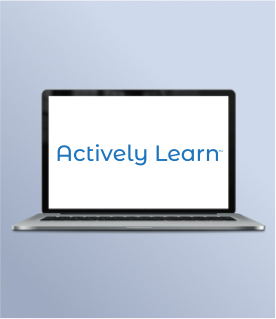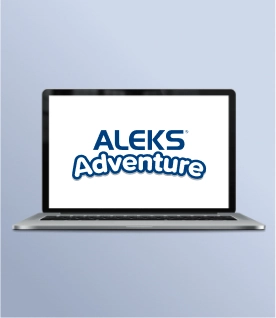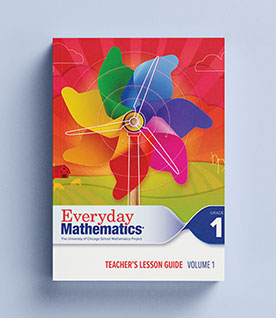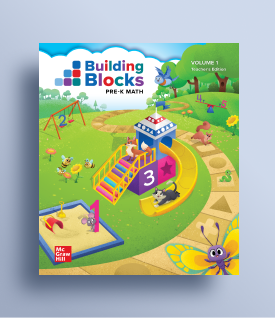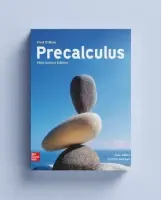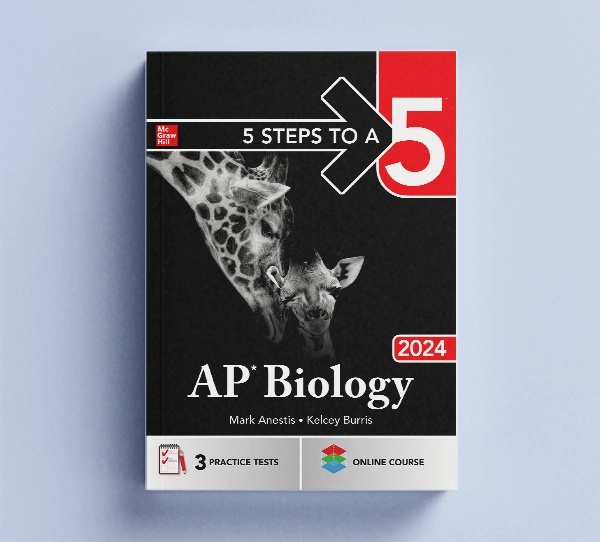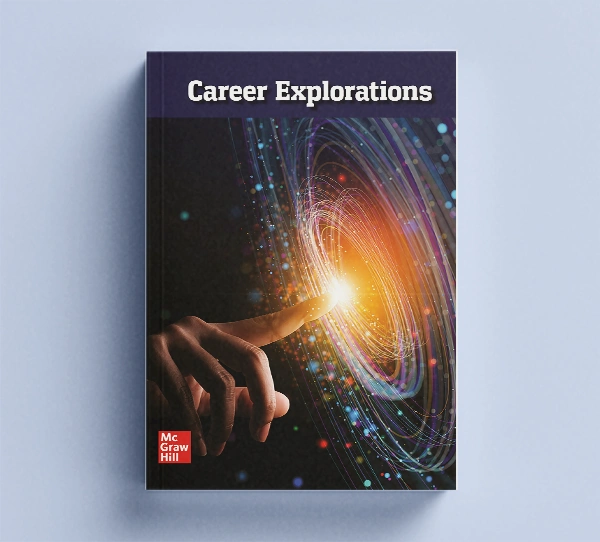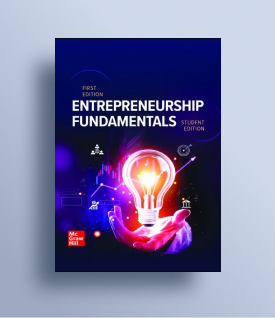My Account Details
McGraw Hill Science Interactives
Innovative Activities for Digital Learning
For Grades 6–12
Virtual Science Experiences for Middle School & High School
Introducing Interactives, exciting, virtual science experiences for your middle and high school students. McGraw Hill Interactives are engaging labs, simulations, and digital experiments that will bring your distance learning classroom to life. These fully online resources allow students to experience new scientific ideas in dramatic, visually appealing demonstrations.
- Available 24/7 for remote or classroom learning— no lab space required
- Easy-to-follow, on-screen instructions
- Labs can be previewed before assigning them
- Real-world scenarios are presented in a digital format
What are McGraw Hill Science Interactives?
These simulations help students learn the practical and conceptual skills needed to excel no matter where they are learning. Interactives provide experiences that range from demonstrations students could execute in a lab—like kinetic energy transformations—to unique at-home experiences that present models such as natural selection.
Interactives routinely provide feedback to students to guide their learning and save you time.
How do I use Interactives?
In the Classroom
- Assign Interactives as preparation for classroom lab work to familiarize students with tools, procedures, and foundational concepts.
- Enhance in-class lessons with dynamic labs to extend concepts beyond the limitations of the classroom.
- Assign Interactives after a lesson to solidify new concepts or assess their understanding.
In Remote Learning
- Assign Interactives before the lesson to engage students in the topic they are about to study.
- Use Interactives as a teaching tool during synchronous instruction to explicitly teach challenging concepts in an engaging way.
- Assign Interactives after a lesson to allow students to expand upon and demonstrate the new ideas they’ve learned.
Browse McGraw Hill Science Interactives
Middle School
- How do meteorologists predict the weather?
- Climate
- How can water pollution be detected?
- Assessing water quality
- What are the advantages of alternative energy sources?
- How much energy is used in a house?
- The Nature of Science
- Water erosion and deposition
- Where do most earthquake epicenters and volcanoes occur?
- Volcanoes
- How do seismograph stations help determine an earthquake’s epicenter?
- What was Earth like throughout geologic time?
- How much landfill space can be saved in a year by recycling?
- How is energy transferred through a community of organisms?
- What strategies are involved in solving a science problem?
- Model Ecosystems
- Energy in a Cell
- Population Biology
- How do introduced species affect the environment?
- How can locations be identified by their climates and topography?
- How can water pollution be detected?
- What are the advantages of alternate energy sources?
- How much energy is used in a house?
- How much landfill space can be saved in a year by recycling?
- Ecosystems, Organisms, and Trophic Levels
- How are living things classified into groups?
- Under what conditions do cells gain or lose water?
- How do the parts of the respiratory system work together?
- What factor affects the transpiration rate in a plant?
- What are the major bones in the human body?
- How does the body protect itself against foreign substances?
- What are some characteristics of waves?
- Virtual Pathology
- The Digestive and Endocrine Systems
- How are traits passed from parents to offspring?
- What are the functions of the parts of a flower?
- Which colors of the light spectrum are most important for plant growth?
- Punnett Squares
- Sex-Linked Traits
- Mealworm Behavior
- How are fish adapted to their environment?
- How are birds adapted to their habitat?
- DNA and Genes
- Gene Splicing
- Natural Selection
- Classifying Using Biotechnology
- Dino Dig
- How can natural selection be modeled?
- What factors affect the likelihood of hypertension?
- How does horizontal motion affect vertical motion?
- Rocket Sled
- Motion, Forces, and Simple Machines
- How is energy converted from one form to another?
- Roller Coaster
- Electric Circuits
- How do seismograph stations help determine an earthquake’s epicenter?
- What is the electromagnetic spectrum?
- Ray Tracing for Mirrors
- Ray Tracing for Lenses
- Which colors of the light spectrum are most important for plant growth?
- How does thermal energy affect the state of a substance?
- Kinetic Theory
- Phase Changes
- Thermal Energy
- How does thermal energy affect the state of a substance?
- Properties of Elements
- Understanding Matter
- How is energy transferred through a community of organisms?
- How much landfill space can be saved in a year by recycling?
- What factors influence the pressure of a gas in a container?
- How can molecular models be built?
- What are the relationships between kinetic energy and potential energy?
- What are some characteristics of waves?
- How are voltage, current, and resistance related?
High School
- Model Ecosystems
- Ecosystems, Organisms, and Trophic Levels
- Communities and Ecosystems
- Population Biology
- Assessing Water Quality
- Enzyme-Controlled Reactions
- Cellular Pursuit
- Energy in a Cell
- Punnett Squares
- Sex-Linked Traits
- DNA and Genes
- Gene Splicing
- Dino Dig
- Natural Selection
- Classifying Using Biotechnology
- Biotechnology Knocking Out Genes
- Plant Transpiration
- Classifying Arthropods
- Earthworm Dissection
- Mammals
- Mealworm Behavior
- Muscle Stimulation
- Blood Pressure
- The Digestive and Endocrine Systems
- Virtual Pathology
- Density
- Decoding the Periodic Table
- Electron Configuration
- Periodic Properties
- Half-Life
- Ionic Compounds
- Molecular Shapes
- Covalent Compounds
- Balancing Chemical Equations
- Moles, Mass, and Molecules
- Limiting Reactants
- Kinetic Theory
- Gas Laws
- Salts and Solubility
- Colligative Properties
- Calorimetry
- Phase Changes
- Reaction Rates
- Titration
- Redox Titration
- Electrochemical Cells
- Functional Groups
- Accelerated Motion
- Rocket Sled
- Inclined Plane
- Soccer Kick
- Universal Gravitation
- Newton’s Cannon
- Hover Gliders
- Roller Coaster
- Kinetic Theory
- Phase Changes
- Doppler Effect
- Ray Tracing for Mirrors
- Snell’s Law
- Ray Tracing for Lenses
- Double-Slit Interference
- Circuits and Ohm’s Law
- Electric Circuits
- Charge in a Magnetic Field
- Photoelectric Effect
- Half-Life of an Element
- The Nature of Science
- Properties of Elements
- The Periodic Table
- Mineral Properties
- Water Erosion and Deposition
- Earth’s Atmosphere
- The Atmosphere in Motion
- Climate
- Oceanography
- Volcanoes
- Earthquake
- Views of Earth
- Lunar Phases
- Ocean Motion
- The Solar System
- Star Composition and H-R Diagrams Placement
Sample McGraw Hill Interactives
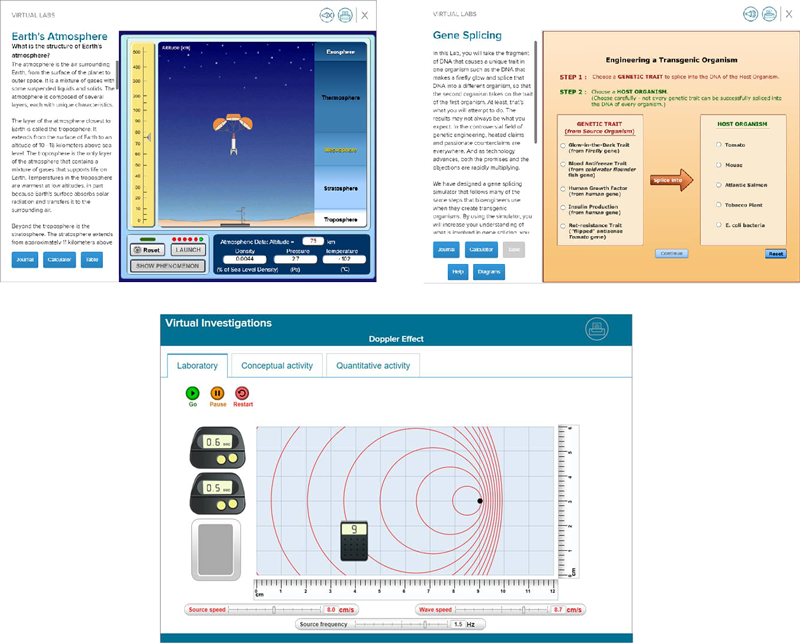
Start your free McGraw Hill Science Interactives 30-day trial!
Grades 6–12
To sample teacher materials, you must enter a school e-mail address. If you would like to sample student materials, please contact your McGraw Hill Sales Representative.
Already started a trial? Log in now.
Fields marked by * are required.
Thank you!
Thank you for your interest in McGraw Hill. You will receive an email with log-in credentials. If you do not see the email in your inbox, please be sure to check your spam folder or email us at epgtech@mheducation.com.
The online sample environment was built for admin/instructor evaluation purposes only. As such, it is important that admins/instructors DO NOT include any personally identifiable or sensitive information in the work they do within this environment. As you explore different features, please use only fictitious data rather than inputting any real school or student data.
McGraw Hill may use your contact information to provide you with materials that we believe are of interest. You may choose to opt out of receiving additional materials at any time by contacting our customer service, sending an email to McGraw Hill's local privacy official, or selecting “unsubscribe” at the bottom of any email you receive from us.
Purchase McGraw Hill Interactives
Middle School Bundles
- Inspire Science Middle School Virtual Lab, 1 Teacher, 1 Student Digital Bundle, 1 Year Subscription
- Inspire Science Middle School Virtual Lab, 1 Teacher, 1 Student Digital Bundle, 2 Year Subscription
- Inspire Science Middle School Virtual Lab, 1 Teacher, 1 Student Digital Bundle, 3 Year Subscription
High School Bundles
- Inspire Science High School Virtual Lab, 1 Teacher, 1 Student Digital Bundle, 1 Year Subscription
- Inspire Science High School Virtual Lab, 1 Teacher, 1 Student Digital Bundle, 2 Year Subscription
- Inspire Science High School Virtual Lab, 1 Teacher, 1 Student Digital Bundle, 3 Year Subscription
Need more student seats? Get add-on student subscriptions here.




